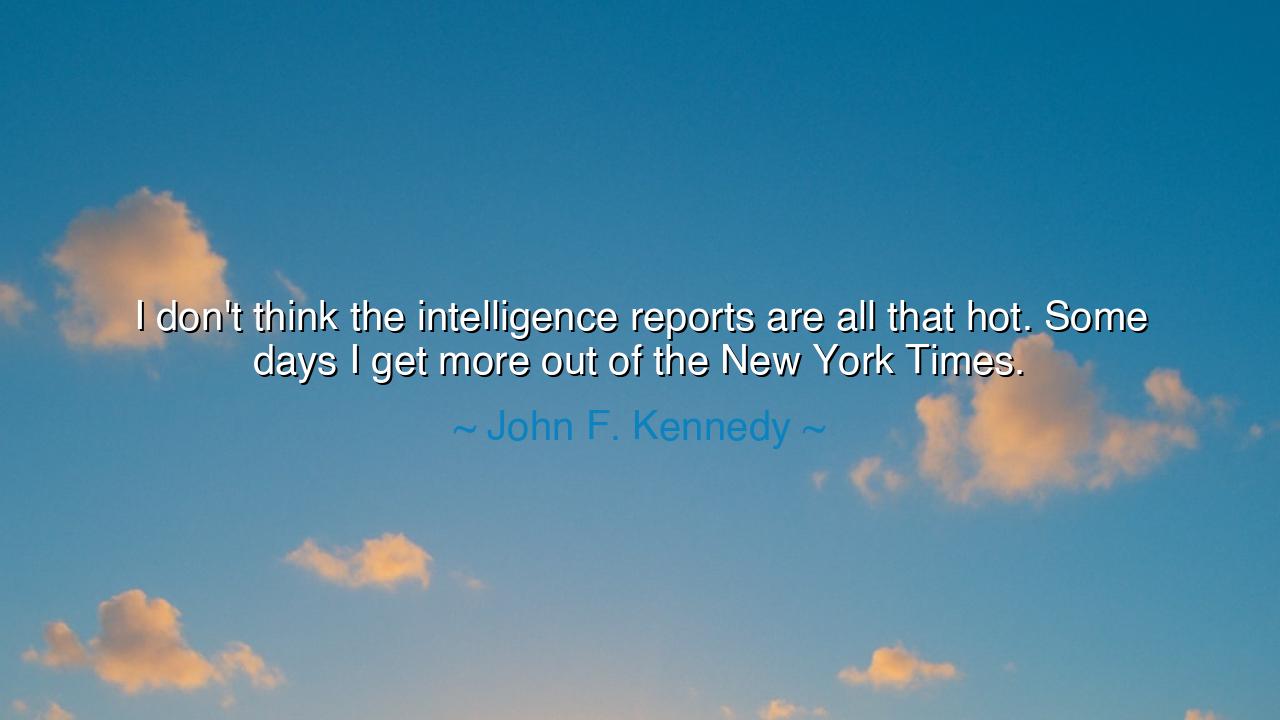
I don't think the intelligence reports are all that hot. Some
I don't think the intelligence reports are all that hot. Some days I get more out of the New York Times.






The Wisdom Beyond Reports
In the annals of history, there are words that rise not from arrogance, but from clarity of vision. Among these are the words of John F. Kennedy, who said, “I don’t think the intelligence reports are all that hot. Some days I get more out of the New York Times.” At first glance, such a statement might seem to belittle the mighty institutions of statecraft and espionage. Yet beneath its simplicity lies a profound truth—wisdom is not confined to power, and truth often hides in plain sight. Kennedy, a man burdened with the fate of nations, saw that even in the corridors of government, the clarity of honest observation can outweigh the weight of secret documents.
The meaning of this quote is rooted in the eternal struggle between knowledge and wisdom, between information and understanding. Intelligence reports are crafted by many hands, filtered through the eyes of analysts, polished by politics, and burdened by the limits of human bias. But truth—pure and unadorned—may shine from unexpected sources. The New York Times, a public chronicle of the age, represented for Kennedy a place where unfiltered perspectives and the pulse of humanity could be felt. In this, he teaches us that true discernment does not depend on the prestige of the source, but on the mind that receives it.
In the days of the ancients, kings had their own “intelligence reports.” Pharaohs relied on priests; emperors trusted soothsayers. Yet history shows that blind trust in advisers often led to ruin. Consider the tale of Croesus, the king of Lydia, who sought the oracle at Delphi before waging war on Persia. The oracle told him, “If you cross the river, you will destroy a great empire.” Taking this as divine approval, he marched forth—only to destroy his own. The oracle had spoken the truth, but Croesus lacked discernment. Like Kennedy’s jest, this story reminds us that the power of knowledge lies not in what is given, but in how it is understood.
Kennedy himself stood at the crossroads of peril. During the Cuban Missile Crisis, his generals and intelligence officers urged decisive military action. Their reports spoke of threats, numbers, probabilities—but the heart of the matter lay beyond data. Kennedy, guided by intuition and reflection, chose patience over aggression, diplomacy over destruction. In doing so, he averted the inferno of nuclear war. His quote thus becomes a testament not to skepticism, but to wisdom guided by humility. He saw that truth is not always dressed in authority; sometimes it whispers from the pages of a newspaper, or from the conscience within.
There is also in his words a quiet rebuke of pride. The powerful often believe that the rarest truths are hidden in locked rooms and encrypted cables. Yet the great mind knows that insight lives among the people—the thinkers, the poets, the witnesses of daily life. A humble heart, open to the world’s chorus, sees more than one cloistered by secret reports. Thus, Kennedy reminds us: do not mistake secrecy for wisdom, nor complexity for truth. A single honest observer, unburdened by agenda, may see farther than a council of experts bound by fear or ambition.
This quote, though light in tone, carries a heroic lesson for every generation. To live wisely is to question even the most trusted voices, to compare what is told to what is seen, and to seek the pulse of truth beyond appearance. The wise ruler, the thoughtful citizen, the reflective soul—all must learn the art of discernment. In every age, there are those who will cloak falsehood in authority, and those who will reveal truth in simplicity. The choice of which to heed determines the fate of nations—and the peace of one’s own heart.
Therefore, let this teaching be passed down: Seek wisdom in all places, for the world itself is your teacher. Read not only the sacred texts or official scrolls, but also the words of the humble, the chroniclers of the age, and the quiet witnesses of truth. Let your mind be ever questioning, your heart ever discerning. Do not chase knowledge for its pride, but for its light. For as Kennedy showed, the measure of intelligence is not what one is told, but what one perceives.
And so, traveler of time and thought, remember this: Truth walks among the common and the great alike, and the eye that is open will see it wherever it dwells. Be not blinded by status, nor swayed by secrecy. Listen, observe, reflect—and you shall find that wisdom, like sunlight, touches both palace and street in equal measure.






AAdministratorAdministrator
Welcome, honored guests. Please leave a comment, we will respond soon